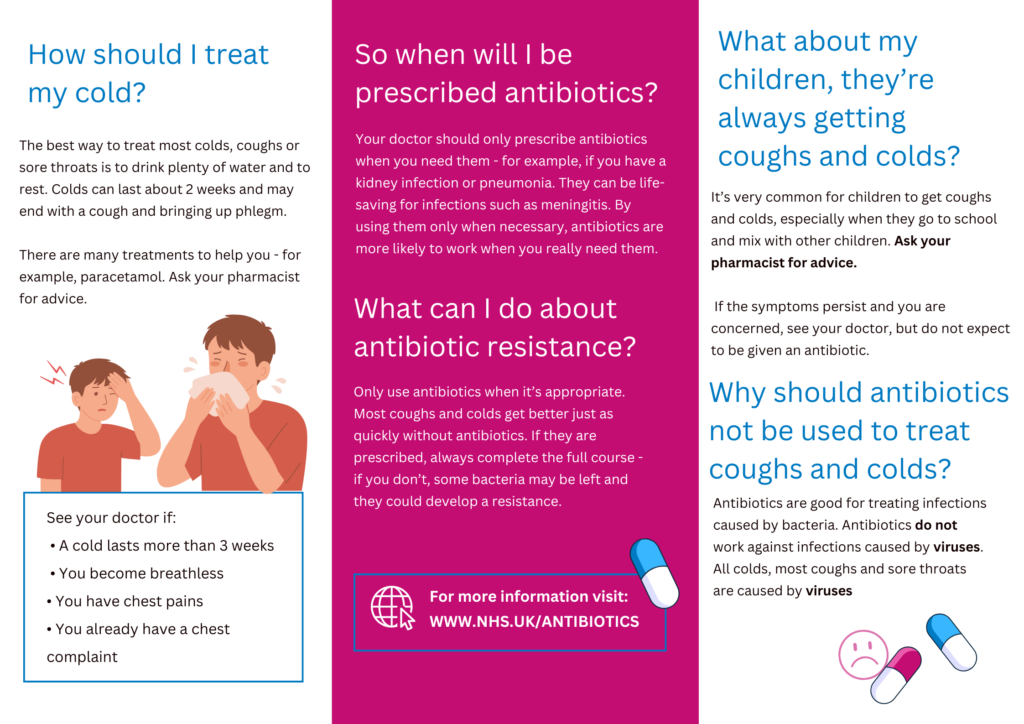Ordering repeat prescriptions
The easiest ways to order repeat prescriptions are:
- using your NHS account
- using the GP online system: Patient Access
These accounts show you all your repeat medicine and dosage and you can choose the ones you need.
You can also:
- bring the paper form to the surgery, Monday to Friday from 8:30am to 6.30pm
We do not take repeat prescription requests over the phone or email.
NHS App
Collecting your prescription
You can usually collect your prescription from the pharmacy 3 to 5 working days after you have ordered it.
You will need to choose a pharmacy to collect your prescription from. We call this nominating a pharmacy.
You can change your nominated pharmacy at any time:
- on the app or website where you order repeat prescriptions
- at your GP practice
- at any pharmacy that accepts repeat prescriptions
Questions about your prescription
If you have questions about your medicine, your local pharmacists can answer these. They can also answer questions on medicines you can buy without a prescription.
The NHS website has information on how your medicine works, how and when to take it, possible side effects and answers to your common questions.
Medication reviews
If you have a repeat prescription, we may ask you to come in for a regular review. We will be in touch when you need to come in for a review.
Prescription charges
Find out more about prescription charges
What to do with old medicines
Take it to the pharmacy you got it from or bring it in to the surgery. Do not put it in your household bin or flush it down the toilet.
About pharmacists
As qualified healthcare professionals, pharmacists can offer advice on minor illnesses such as:
- coughs
- colds
- sore throats
- tummy trouble
- aches and pains
They can also advise on medicine that you can buy without a prescription.
Many pharmacies are open until late and at weekends. You do not need an appointment.
Most pharmacies have a private consultation room where you can discuss issues with pharmacy staff without being overheard.
Prescription Requests when Travelling or Moving Abroad
Under current legislation, the NHS’s duty of care ends when a person has been absent, or intends to be away from the United Kingdom for a period of more than three months. A supply of medications for up to three months can be made to allow the patient to find a prescriber at their destination. Two three month prescriptions would not be acceptable under current legislation. Patients who return to the UK for the purpose of obtaining medication, or who use a local proxy to request prescriptions on their behalf should be refused supply. Patients should be directed to local services in their country of residence with the offer of supplying appropriate medical notes and a list of current medicines to their qualified medical practitioner.
When a GP provides a prescription, they are responsible for any adverse events that occur as a result of taking the medicine, regardless of where the patient happens to be. So a doctor would be ill-advised to prescribe for a patient who they know will out of the country. GPs are also required to deregister a patient who they know or suspect to be residing outside the UK for three months or more.
Antibiotics
Antibiotics are medicines used to treat infections caused by bacteria. They work by killing bacteria or stopping their growth. However, they are not effective against infections caused by viruses, such as the common cold, flu, or COVID-19.
When to use antibiotics:
- Bacterial infections: If a healthcare provider diagnoses you with a bacterial infection (e.g., strep throat, urinary tract infection, bacterial pneumonia), antibiotics may be prescribed.
- Prevent infection: In some cases, antibiotics are used to prevent infections after surgery or if someone is at high risk of infection (e.g., immunocompromised individuals).
When NOT to use antibiotics:
- Viral infections: Antibiotics do not work for viruses, so they should not be used for colds, flu, or most coughs and sore throats.
- Unnecessary use: Using antibiotics for non-bacterial conditions can lead to antibiotic resistance, making future bacterial infections harder to treat.
Always follow your doctor’s advice when taking antibiotics to ensure they are used correctly and effectively.
